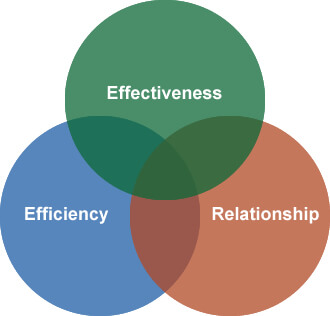Bonnie Marden explores the importance of relationships to congregational vitality, and she suggests key questions for assessing the strength of relationships that undergird a congregation’s ministry.
The strength and quality of relationships within a congregation is strongly connected to vitality and growth. Healthy relationships are motivating. They support networks that undergird amazing ministry and missions, whereas broken relationships and unresolved conflict are strongly correlated with congregational decline. The enduring strength of relational ties can enable small congregations to survive against all odds. But those same relationships can inhibit change and cause churches to cling to outdated models of ministry.
Churches know they are in the relationship business, but it’s difficult to quantify and assess the relational dimension of congregational life.
 How might we explore a deeper understanding and appreciation for the value of relationships in faith communities? Consider a Venn diagram with three overlapping circles. One circle represents effectiveness (what we do), a second represents efficiency (how well we do what we do) and the third representing relationship. Events that bring the circles closer together generate synergy and growth. Events that pull the circles apart cause the community to struggle in all three areas making accomplishing goals difficult with diminishing trust and commitment. Actions that appear logical and necessary from the effectiveness and efficiency perspective will often succeed or fail based on the relationship factor. So, tending the relational dynamic becomes critical to fruitful ministry.
How might we explore a deeper understanding and appreciation for the value of relationships in faith communities? Consider a Venn diagram with three overlapping circles. One circle represents effectiveness (what we do), a second represents efficiency (how well we do what we do) and the third representing relationship. Events that bring the circles closer together generate synergy and growth. Events that pull the circles apart cause the community to struggle in all three areas making accomplishing goals difficult with diminishing trust and commitment. Actions that appear logical and necessary from the effectiveness and efficiency perspective will often succeed or fail based on the relationship factor. So, tending the relational dynamic becomes critical to fruitful ministry.
Churches know they are in the relationship business, but it’s difficult to quantify and assess the relational dimension of congregational life. Data on participation, revenue, resources, and operational costs are readily available. But without assessing relationships, typical metrics can create incomplete and misleading perceptions about congregational impact.
How might relationship characteristics be identified and valued? Such ideas and metrics are needed to appreciate more fully the vitality of congregations. Questions like these might offer a different angle of vision on the strength of a congregation’s ministry:
- How strong and deep are relationships among members?
- Are there stories of healing or reconciliation in our church?
- Are we sharing stories that celebrate the power of relationships in our church?
- Do members spend time with each other beyond church activities?
- How many people are involved in or impacted by our mission ministries?
- How many charitable or faith-based organizations partner with our church?
- How many volunteer opportunities are our ministries creating?
- Which community groups use our facilities?
God is calling us to relationship! Let’s be sure to pay attention to the relational aspects of all our ministries.
Related Resources
- Relationships Are Everything by Lovett H. Weems, Jr.
- Leadership is Always About Others by Lovett H. Weems, Jr.
- 50 Ways to Increase Active Engagement, a free Lewis Center resource






